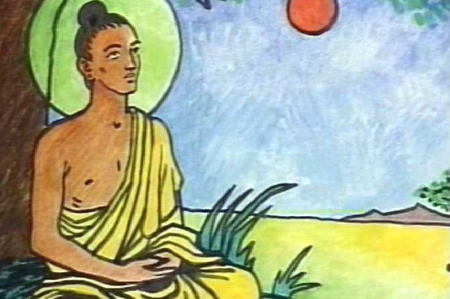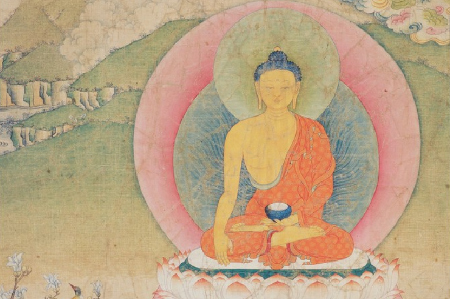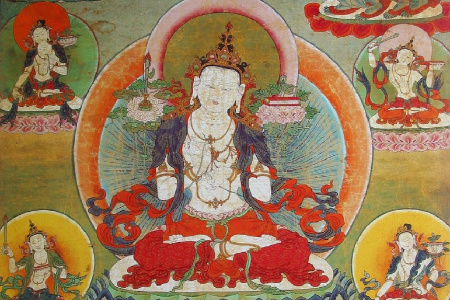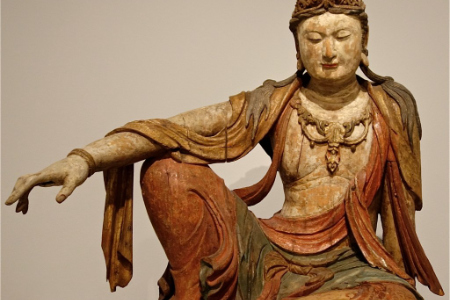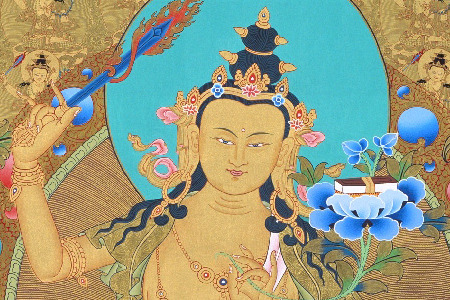STORIES from the BUDDHIST TRADITION - aged 4 to 7
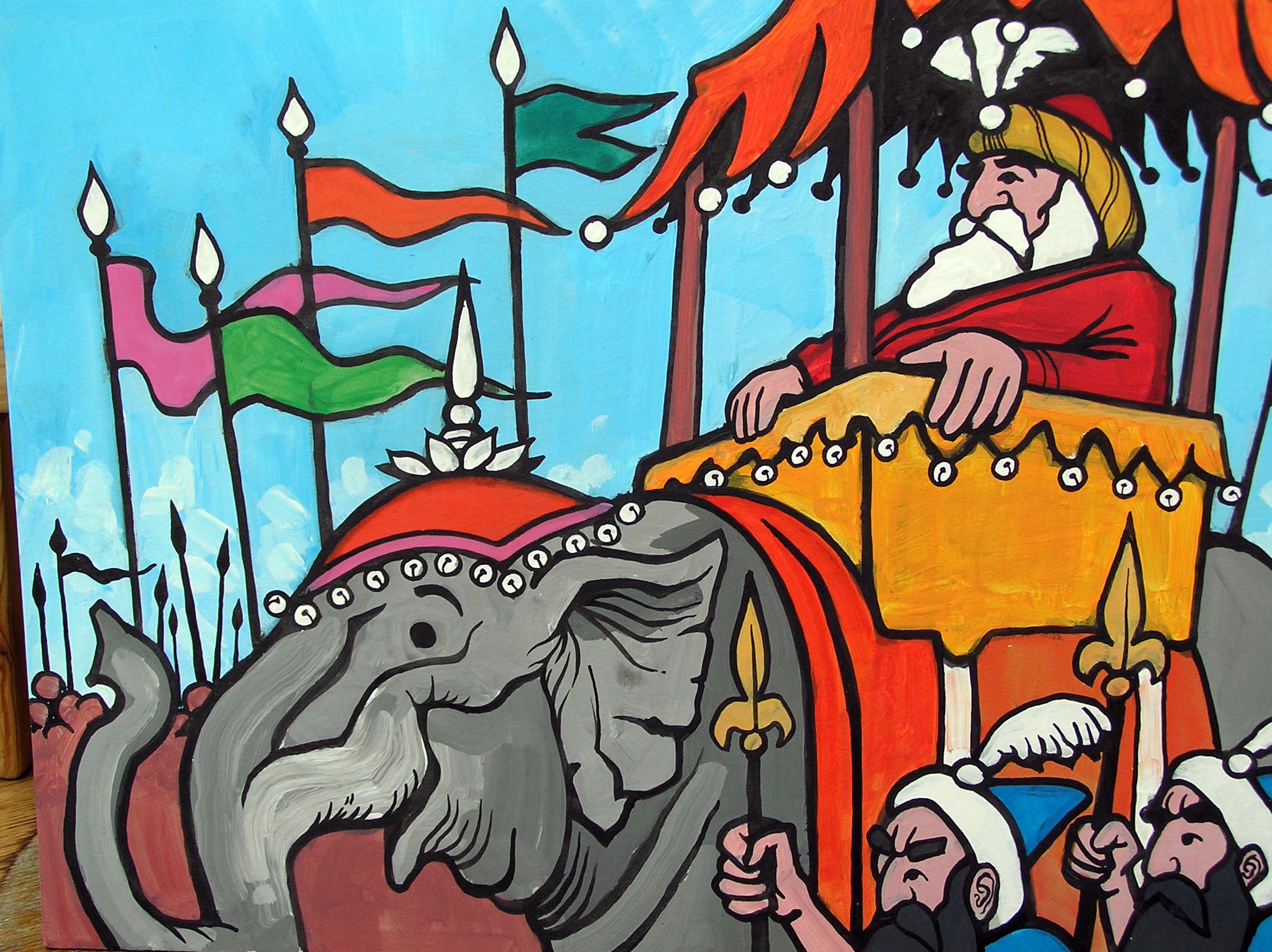
Stories from the Buddhist tradition
Siddhartha and the Swan
Siddhartha and the Swan
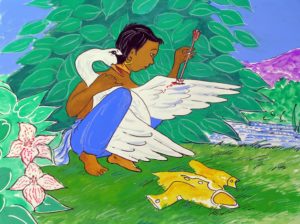
Long ago in far-away India, near the great Himalayan mountains, there lived King Sudhodana and his wife, Queen Maya. One day, the Queen gave birth to a baby boy, their first child. They called the baby Siddhartha.
Naturally, the King and Queen wanted their family and friends to see their new baby so, at their invitation, people came from far and wide. Among the visitors was a wise old fortune-teller who had come down from his home in the mountains.
“Tell me,” said the king, “what future do you see for my son?”
“Well, your majesty,” replied the old man, “your son could become a great king one day…”
“I knew it!” exclaimed the king excitedly. “He will rule the kingdom after me.”
“On the other hand,” continued the old man, “he may choose to leave the palace and lead a simple life, devoting himself to helping others instead.”
“He’ll do no such thing!” retorted the king. “He’s going to be a king, like me!”
So the young prince Siddhartha grew up surrounded by luxury. The King watched over him and made sure that he had the best of everything. He was proud of his son and wanted him to be happy and enjoy the royal life.
One day, when the prince was seven years old, his father sent for him.
“Siddhartha,” he said, “when you grow up you will be king and rule our kingdom. It is now time for you to begin your training.” And so Siddhartha began his education. He was taught how to ride a horse, how to shoot an arrow; how to wrestle and use a sword: all the skills that a warrior king would need.
Siddhartha learned his lessons well, as did his cousin, Devadatta. The two boys were about the same age and the king thought that they would be good company for one another. Every day, when his lessons were over, Prince Siddhartha would go and play in the palace grounds where all sorts of animals lived. He particularly liked to walk near the lake in the evening. Every year since he was a baby, a pair of beautiful white swans had nested there and he liked to sit and watch them.
Then, one evening, he saw three more beautiful wild swans flying overhead. Suddenly, as he watched, one of the swans faltered and fell to the ground.
“Oh no!” cried Siddhartha. “What can have happened?” So as not to frighten it any more, Siddhartha went very quietly up to where the swan lay and began to stroke it gently. An arrow was sticking out of its wing.
“Now I understand,” said Siddhartha. “Someone has shot you.” Taking great care, he removed the arrow and took off his shirt and wrapped it around the swan.
“I’ll look after you until your wing is better,” he said.
Just then, he heard a voice. “Where is it? I know it must be around here somewhere; I saw it fall!” It was Devadatta, Prince Siddhartha’s cousin, who came running up carrying his bow and arrow.
“Hey, that’s my swan! I shot it. Give it to me,” he demanded.
“You can’t have it,” replied Siddhartha. “It’s a wild swan. It doesn’t belong to you.”
“I shot it so it’s mine; everyone in this kingdom knows that,” said Devadatta, getting angry.
“You’re right, that is the law of our kingdom,” replied Siddhartha, “but this swan isn’t dead.She is injured and I want to help her get well again.” The two boys began to argue.
“Stop,” said Siddhartha. “This isn’t helping. Let’s go and ask the king and his wise ministers to help us settle this.”When they got to the meeting hall, everyone looked very busy.
“We’ve come to ask you to help us settle a disagreement,” said Siddhartha. And the ministers listened as Siddhartha and Devadatta told them what had happened.
“…and I shot the swan, so it rightfully belongs to me,” concluded Devadatta. The ministers nodded their heads. It was indeed the law of the kingdom that an animal or bird belonged to whoever shot it.
“That would be so if it were dead,” argued Siddhartha, “but I saved it. It is wounded but it is still alive.”
Now the ministers shook their heads. They were puzzled. Who did the swan belong to?
“I think I can help,” a voice said. Looking up, they saw an old man standing in the doorway. He approached and looked at the wounded animal in Siddhartha’s arms.
“If this swan could talk,” said the old man, “it would tell us that it wanted to be well again and be free to fly and swim with the other wild swans. None of us wants to feel pain or die and it is the same for the swan. It wants to live, so it should go to whoever wants to give it life.”
“Let it be so,” said the king. “Siddhartha shall keep the swan. Thank you, old man, for your wise advice.”
But the old man had already disappeared, as quietly as he had come.
All this time, Devadatta had stood silent. He remembered how kind his mother had been when he had once fallen and cut his leg badly. She had bandaged the cut and looked after him. He had never before stopped to think that animals had feelings – that they too felt pain and appreciated kindness.
And so the two boys cared for the swan until it was well again and, one evening, when its wing was completely healed, they led it down to the palace lake. Just then, the familiar sound of beating wings could be heard overhead.“Look,” said Devadatta. “The others have come back for her.”
Soon, the swan rose into the air to join her friends. She circled the lake one last time, as if to say goodbye before flying off towards the mountains in the North.
Angulimala meets the Buddha
Angulimala meets the Buddha

One hot day, the Buddha set off as usual to collect gifts of food from a nearby village. But as he approached the village, he realised that something was wrong. There was silence and the streets were deserted. “What is going on?” he wondered. “Where is everyone?”
The Buddha carried on towards the nearby city to see if he could find out what had happened. The road to the city was full of people hurrying past him.“Why is everyone in such a rush?” asked the Buddha.“It’s that terrible robber, Angulimala,” said a woman. “He’s roaming the countryside around here. Even the King and his soldiers are afraid to try and catch him! We’re going to the city for safety.”“Who is this robber, Angulimala, who makes everyone so afraid and unhappy?” wondered the Buddha. “I must go and meet him.”
Meanwhile, Angulimala was sitting outside his den, planning the day’s work.He was a fierce-looking character. He had huge, wild, staring eyes, and his face was covered in scars. Around his neck was the terrible necklace of fingers which had given him his name. So far there were ninety-nine fingers, chopped off the hands of the people he had robbed.“One more finger and my necklace will be complete!” he gloated. “I wonder who will be my next victim.”
At that moment, the Buddha appeared, walking slowly and calmly.“How dare he walk past my den?” thought Angulimala. “I’ll have one of his fingers to finish my necklace! That will teach him a lesson.” Down he jumped and began to run after the Buddha. But, run as he might, he couldn’t catch up with him.“Stop!” shouted Angulimala. “Stand still!”The Buddha turned and looked Angulimala in the eye.“I have stopped; I am still, Angulimala. It’s you who needs to stop.”“Don’t try to fool me!” shouted Angulimala, waving his sword. “I could see you were moving.”“Ah,” said the Buddha. “But I meant something else.”“Something else?” roared Angulimala, getting angry.“I have stopped,” repeated the Buddha. “I am still, because I never harm, I never kill. You can’t stop; you’ll never be still, as long as you harm, as long as you kill.”
No one had ever spoken to Angulimala like this before. He began to get a bit worried. This man clearly wasn’t afraid of him. He became even more furious.“Don’t you know who I am?” he screamed. “I am Angulimala, the robber with the necklace of fingers. I am the terrible adventurer.”“What you need, my friend, is a real adventure,” replied the Buddha.“‘Friend?’” asked Angulimala. “Did you say ‘friend’?”Angulimala was very surprised. No one had called him “friend” for a very long time. In fact, he didn’t have any friends. Everyone was afraid of him.He remembered how, when he was little, he used to have friends. Then he had started to bully the smaller boys and girls until, in the end, no one wanted to be his friend. Then things had got worse and he had begun to steal from people’s houses. Now he was the terrible robber from whom everyone ran away.“What have I been doing?” he exclaimed. “No wonder no one wants to be my friend.”“Angulimala,” asked the Buddha kindly, “why don’t you come and live with me and my friends? If you were very brave you could make a fresh start. Now that would be a real adventure!”Angulimala walked to the edge of the cliff and threw his sword and shield over.“Are you sure this will be an adventure?” he asked.“Oh yes,” replied the Buddha. “The greatest adventure of your life!”
That night, Angulimala stayed with the Buddha and his friends under the stars. These people were kind. They shared their food and talked to him. No one was afraid.Perhaps he could be different, he thought. Deep down, he was tired of his old life; all that robbing and hurting other people had never really made him feel happy. Although he knew it might be difficult to change, he decided to stay with the Buddha and his new-found friends.
In the morning, he threw away his terrible necklace of fingers. Then he cut off his long hair and beard and put on the same simple robes that the others wore. He was already feeling better.
One morning a week or two later, as Angulimala sat talking with the Buddha, the king suddenly appeared in the clearing.“Good morning, your majesty,” said the Buddha, smiling. “Where are your guards and attendants? Have you come alone?”“I didn’t want to bring them with me,” answered the king. “It might have attracted the attention of that robber, Angulimala. My people are terrified of him; even my soldiers refuse to go and search for him. What am I to do? It can’t go on like this!”“What would you say if I told you that Angulimala was no longer a robber?” asked the Buddha.The king smiled. “I wouldn’t believe it,” he said. “That cut-throat!”“That cut-throat”, said the Buddha, “is now as kind and gentle as any of my followers…”“Impossible!” interrupted the king.“…and he’s sitting next to you!” continued the Buddha.The king turned to look at Angulimala, who sat looking at him, smiling.“You? Angulimala?” exclaimed the king, jumping up.“Have no fear,” said the Buddha. “Angulimala is now a changed man.”The king smiled nervously. “I’m very pleased. What a relief! You’re going to stay with the Buddha? Good, good … I must go now – such a busy day ahead.” The king hastily said goodbye and hurried away as quickly as possible.
The Buddha smiled at Angulimala, who smiled back. Then he got up and went off to help his new friends collect their food for the day.
The Lion and the Jackal
The Lion and the Jackal
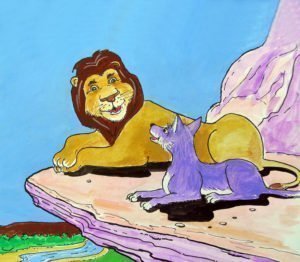
One day, a young lion was hunting in the hills when he found a cave. “This cave would make a perfect home for our family,” he thought. “It will shelter us at night, and each morning we can go down to the river to catch some food. In fact, I think I’ll catch some now,” and he bounded down the hillside towards the river.
The young lion raced along the muddy bank and hurled himself over a bush in an attempt to catch a deer. He missed and landed instead right in the middle of a patch of deep mud. He struggled to get free, but the more he struggled, the deeper he sank.
“Oh no! I’m stuck!” he gasped. “What can I do now? Perhaps, if I roar loud enough, one of the other lions may hear me.”
All day long, the young lion roared, but no one came. He remained stuck in the mud, which had begun to dry, making it even harder for him to move.
“Who can possibly help me?” he groaned. “My friends don’t know where I am, and all the other animals are afraid of me. I’m going to die here. ”For a whole week, he lay trapped in the mud.
“I’m done for,” he thought. But suddenly he heard a sniffing noise.
“Please help!” he gasped.
A grey head peered cautiously around the bush. It was a jackal.
“Don’t run away, jackal,” said the lion. “Please save me.”
“Why should I save you?” replied the jackal. “You’d just eat me as soon as you were out of that mud.”
“If you help me now, I will always be your friend,” said the lion. “Everything I catch I will share with you and your family.”
The jackal knew that if she did not help him, he would slowly starve to death. “Do you promise?” she asked. “As the king of the beasts, I give you my word,” said the lion.
Very cautiously, she crept across the dried mud towards the lion. Then she began to dig.
“It would help if we had some water to soften the mud,” she said. So she found a coconut shell and started to carry water to pour round the lion’s legs.
“You loosen the mud around your paws and I’ll push from under your stomach,” said the jackal.“One last effort and you’ll be free.” And she stood back, hoping that she had been right to trust him.
“Thank you, jackal,” said the lion. “Thank you for trusting me; thank you for helping me. From now on, I will always be your friend.” With that, the lion went off and caught some food for them both. And so it was that the lion and the jackal became good friends.
One day, the lion and the jackal sat together on the ledge by the the river.
“Why don’t we all live here?” said the lion. “We could shelter in these caves and even take turns to look after the little ones.”
“What a great idea!” replied the jackal. The next day, the lions and the jackals all moved into their new home. Within a few hours, the lion cubs and the little jackal pups were making friends, playing together and chasing each other over the rocks.
As the dry months passed, the river dwindled and the lush green grass became brown and shrivelled. Each day the lion and the jackal hunted together but food became hard to find. The lion kept to his word and they shared out the catch, even when there was not really enough to go around. All the animals began to feel rather grumpy and bad-tempered.
One day, two of the older lions sat on the ledge watching the hunt.
“Just look at our young lion down there wasting his time. There’s not enough food to go around, and our catch is still shared with all those jackals.”
“Yes,” agreed the other. “It’s time we got rid of them and all their noisy pups.” And so they went on.
Unfortunately, one of the sharp-eared jackals playing nearby overheard the old lions moaning and immediately went off and told his friends.
“Those smelly old lions do nothing but sleep all day,” he complained. “And that young lion wouldn’t catch anything without the help of our cunning mother jackal.”
Before long, other rumours and tales were being told. The lion cubs and jackal pups began to squabble and fight when they played together.When anything went wrong, the lions would blame the jackals, and the jackals would blame the lions!
Then, one day when food was so scarce that no one had eaten for several days, one of the old lions spotted a jackal pup carrying a bone in its jaws.
“Those good-for-nothing jackals must becatching food and keeping it all for themselves,”he growled, and roughly snatched the bone fromthe puppy.
“Just look at this,” he said to the young lion, dropping the bone in front of him. “As well as sharing our food, those sly jackals are catching meat and keeping it for themselves. It’s time we drove them out of here.”
“It is a puzzle,” said the young lion, “but the mother jackal is my friend. I will ask her about this.”
So he took the bone over to where she sat. One of the jackal puppies was crying.
“..and then that old lion took my bone away,” whimpered the little pup.
The jackal shook her head as the young lion approached.
“This is no good,” she said. “If we cannot live happily together we shall have to leave this ledge. How can we trust the lions when they steal from our pups?”
“Where did the pup get this food from?” asked the young lion.
“This isn’t fresh food,” said the mother jackal.“He’s saved this bone from the catch we made last week.”
“Of course; now I understand,” said the lion. “I knew that we could trust each other. Spreading rumours and telling tales has undermined our friendship.”
That night, he called the lion family together. He told them all about how the jackal had saved his life, and about the promise he had made to share his catch with the jackals and not harm them.The other lions hung their heads in shame.
“We are sorry,” they said. “We had no idea. If that jackal had not trusted you and helped you, you would have died. Our unkind words have caused a lot of trouble and unhappiness. We must go and apologise at once.”
And so they did – and from that day on, the two families lived as friends.
Kisa and the Mustard Seed
Kisa and the Mustard Seed
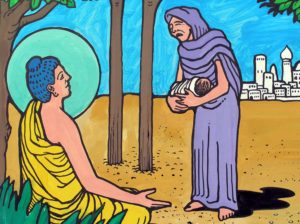
Kisa grew up in an Indian village a long time ago. When she was quite young, she got married and went to live with her husband’s family in a town called Kapilavattu. When she first moved in with them, things were difficult. She missed her village, her family and her friends. She felt that no one liked her and that everything she did was wrong. Then, when her son was born, everyone was very pleased and her life improved. But when the baby was still tiny, her husband died. Kisa was very upset. “At least I still have my little son,” she thought.
One sad day, the baby also became very ill and died. Kisa was so unhappy that she just couldn’t believe that her baby was dead. She thought he must be asleep. She wanted to find some special medicine that would make him better and began asking everyone. First she asked her neighbour.
“Please, can you help me?” she asked. “I need some special medicine for my baby.”
“I’m sorry, Kisa,” said the woman, “I’m too busy to stop now. Why don’t you ask the shopkeeper?” Sadly, Kisa thanked her and went to find the shopkeeper. But the shopkeeper only told her to ask the doctor.
“Please, can you help me?” Kisa asked the doctor. “I need some special medicine for my baby.”
The doctor looked at the baby in Kisa’s arms. He could see that it was dead. “I’m sorry, Kisa,” he said. “I haven’t got the medicine you need.”
Was there anyone who could help Kisa, he wondered? Then he remembered that the Buddha was staying nearby. He was wise and very kind. Maybe he would know how to help.“Kisa,” he suggested, “why don’t you go and ask the Buddha?”
The Buddha was sitting in the shade of a tree talking to his friends when Kisa ran up to him. He could see straight away that she was very upset. “How can I help you?” he asked.
“My name is Kisa,” she replied. “I have been looking everywhere for medicine for my son.”
The Buddha looked at the little bundle in Kisa’s arms. How could Kisa be helped to accept the truth that her little boy had really died?
“Kisa, if you want to make some medicine, you must have some mustard seeds,” said the Buddha. “Go into town and ask at each house, but you must only accept seeds from a house in which no one has died.”
Quickly, Kisa set off into town to get the mustard seeds. At the first house a young woman answered the door.
“Could I have some mustard seeds to make some medicine?” Kisa asked.
The woman went back inside and soon returned with some seeds.“Here you are,” said the woman, smiling.Kisa was just about to take the seeds when she remembered the Buddha’s words.
“Oh, I nearly forgot,” said Kisa. “Has anyone died in this house?”
“Ah, yes,” replied the young woman. “A few months ago my grandmother died, very peacefully. She was a lovely old lady and we remember her very fondly. But why do you ask?”
“Thank you for getting me the seeds,” said Kisa, “but I can only take them from a house in which no one has died.”
Kisa said goodbye and went on to the next house. An old man was sitting outside.
“Please, have you got some mustard seeds to spare?” she asked him. Slowly, the old man got up and went into the house. Soon he emerged with some seeds.
“Here you are,” he said, holding out his hand.Again, just as Kisa was about to take the seeds, she remembered what the Buddha had said.
“Has anyone died in this house recently?” she asked.
“Ah,” replied the old man sadly, “just last year the lady of the house, my daughter, passed on. We all still miss her.”
“I am sorry to hear your sad news,” said Kisa.
“Thank you for getting me the seeds, but I’m afraid I can’t take them after all.”
At the next house she came to, a young boy answered the door.“Please, have you got some mustard seeds to spare?” she asked.“I’m sure we have,” said the boy. “Wait there and I’ll ask my mum.” Soon the boy came back with the seeds. “Here you are.”
This time, Kisa remembered! “Can you tell me please if anyone has ever died in this house?” she asked.
“Yes,” replied the boy quietly. “When I was still a little baby, my dad died. I can’t even remember him.”
“I’m sorry about your dad,” said Kisa, “and thank you for getting me the seeds, but I can’t use them after all.”
As Kisa went from door to door, the answer was the same. Everyone had lost a loved one; if not last year, then a long time ago. Kisa had no mustard seeds but now she understood why she would not be able to find any. She looked at the little bundle in her arms. “I am sorry, my little one, you have gone to another life and I did not want to let you go. Let us find a resting place for you.”
In the evening, she returned to the Buddha. She was no longer carrying the little bundle. Her face was now much calmer.
“Have you been able to find the mustard seeds, Kisa?” he asked.
“No,” she replied, “but now I understand that everyone loses people they love. I have laid my baby to rest, and am now at peace. Thank you.”
“You have done well, Kisa,” said the Buddha, “for there is nothing stronger in all the world than a mother’s love. Would you like to stay with me for a while?”
As the sun went down over Kapilavattu, Kisa and the Buddha talked. She told him about her life and her baby. He listened kindly. The Buddha reminded Kisa that plants grow in the spring, flower in the summer, and die in the winter – and that new plants grow the following year. Similarly, people are born and eventually die. Kisa now understood that was just how things are.
Talking to the Buddha and listening to his kind words helped Kisa a lot. That very evening she decided to become one of his followers.
The King's Elephant
The King’s Elephant
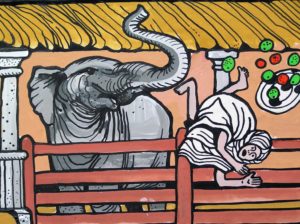
Once upon a time there was a King of Benares who was very rich. He had many servants and a beautiful palace with wonderful gardens; he had chariots and a stable full of horses. But his most prized possession was a magnificent elephant called Mahaghiri. She was as tall as two men, and her skin was the colour of thunder clouds. She had large flapping ears and small, bright eyes and she was very clever.
Mahaghiri lived in her own special elephant house and had her own keeper, Rajinder. The King would often visit Mahaghiri to take her some special tit-bit to eat and check that Rajinder was looking after her properly. But Rajinder needed no reminding, for he also loved the elephant dearly, and trusted her completely. Every morning, he would take her down to the river for her bath. Then he would bring her freshly cut grass, leaves and the finest fruits he could find in the market for her breakfast. During the day, he would talk to her and, in the evening, he would play his flute to send her to sleep.
One morning, Rajinder arrived as usual with fruit for Mahaghiri’s breakfast. Suddenly, before he knew what was happening, she picked him up with her trunk and threw him out of the stall, breaking his arm. She began to stamp on the ground and trumpet so loudly that it took several strong men all morning to bind her with ropes and chains.
When the king heard about what had happened, he was very upset and sent for the doctor to help Rajinder. Then he called for his chief minister.
“You must go and see Mahaghiri at once,” he said. “She used to be so kind and gentle, but this morning she threw her keeper out of her stall. I can’t understand it. She must be ill or in pain. Spare no expense in finding a cure.”
So the chief minister went to see Mahaghiri, who was still bound firmly with ropes. First he looked at her eyes – they were as clear and bright as usual. Then he felt behind her ears – her temperature was normal. Next he listened to her heart – that was fine too – and checked all over for cuts or sores. He could find nothing wrong with her.
“Strange,” he thought. “I can find no explanation for her bad behaviour.”But then his eye was caught by something gleaming in the straw. It was a sharp, curved knife, like the ones used by robbers. Could there be a connection?
That night, when everyone else had gone to bed, the chief minister returned to the elephant house. There, in the stall next to Mahaghiri’s, sat a band of robbers. “Tonight we’ll burgle the palace,” said the chief. “First, we’ll make a hole in the wall, then we’ll steal the treasure.
“But what about the guards?” someone asked.
“Don’t tell me you’re still afraid to kill! When will you learn to be a real robber?”
From the shadows, the minister could see the elephant, her ears pinned back, listening to every hateful and violent word.“Just as I suspected,” thought the minister.
Then he slipped out, bolted the door on the outside so the robbers could not escape, and went immediately to the king.“Your majesty,” he said, “I think I have found the cause of your elephant’s bad behaviour.”
As soon as the king heard what the minister had to say, he sent for his guards and had the robbers arrested. “But what about the elephant? How can she be cured?’ he asked.
“Well, your majesty, if Mahaghiri became dangerous through being in the company of those wicked robbers, perhaps she could be cured by being in the company of good people.”
“What a brilliant idea!” exclaimed the king. “Let us invite the friendliest, happiest and kindest people in the city to meet in the stall next to the elephant.”
“Mahaghiri, the king’s most prized elephant, has been in bad company and has become violent and dangerous,” the minister told his friends. “Will you help her to become her old self again?”“Of course,” they replied. “What do you want us to do?”
“Just meet in the elephant house every day for the next week. Let her hear how kindly and thoughtfully you speak to each other, and how helpful you are.”
So the minister’s friends met in the elephant house as planned. They talked together and enjoyed each other’s company. Sometimes they brought cakes and sweets to share; sometimes their children came and played happily in the straw. All the while, Mahaghiri watched and listened. Gradually, she became calmer.
“I think it’s working,” said the minister. “Soon we’ll be able to remove the ropes.”
Everyone felt a bit nervous when the day came for Mahaghiri to be untied. The king ordered everyone to wait outside as, very carefully, brave Rajinder began to undo the ropes around her ears and trunk. Next he removed the ropes holding her head. Finally, he loosened the thick chains holding her great feet. Everyone held their breath. What if she was still wild?Mahaghiri looked round shuffling her feet to stretch them. Then she slowly curled her trunk around her keeper’s waist and lifted him high into the air before placing him gently on her back. A great cheer went up. The king was delighted.
“Let’s have a picnic to celebrate,” he announced. “Mahaghiri can come too.”
What a great afternoon they all had! Mahaghiri bathed in the lake and gave the children rides. It seemed as though she had now become kinder, gentler and even more trustworthy than ever. But Rajinder never forgot what had happened and was always careful to set Mahaghiri a good example by being kind and friendly himself.
The Monkey King
The Monkey King
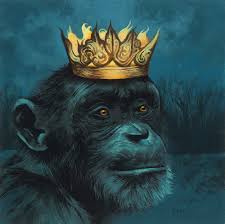
Far away in the East, high among the mountain forests, there once lived a band of monkeys. One day, when some of the younger monkeys were exploring, they spotted a tree growing on the banks of a river. Its branches were full of the most delicious-looking fruit. It was a mango tree.
“Look,” called the smallest monkey. “A fruit tree.”
“Stop,” said his big sister. “Don’t eat the fruit; it might be poisonous. Let’s take one back to our king. He’ll know if it’s good for us.”
The monkey king took the golden fruit, sniffed it and then tasted it.
“Umm-HMMHH! Absolutely delicious!” he exclaimed. “Are there any more where this came from?”
“Oh yes, hundreds of them,” replied the little one excitedly.
Before long, they found the tree again.
“What a beautiful tree!” said the monkey king. “We could all live here, but we must be careful not to let any fruit drop into the water. If one were carried away down the river to the towns where the humans live, someone might taste it and come looking for this tree. Let us first pick all the fruit that hangs over the river. That way we will be safe.”
For many months, the monkey band lived happily in the fruit tree. Everyone took great care not to drop any fruit into the water. But no one had noticed one last mango hanging over the river. One night, while everyone slept, a breeze stirred the branches and, unseen by anyone, the mango fell into the water and drifted downstream.
Some days later, the king of the humans was bathing in the river when one of his men spotted the mango. The king picked up the fruit and wondered what it was.
“Here, taste that!” he ordered one of his guards.
“It’s very good, your majesty,” replied the guard, taking a bite.No sooner had the king tasted the fruit himself than he wanted more.“I want to find that fruit tree,” he said greedily. “It must be somewhere upriver. We will make a raft and find it.”
In the mountain forest, the monkeys rested in the shade of the mango tree. Suddenly, the little monkey called out; he had seen the raft approaching with the king and his soldiers on board.
The king ordered his men to pick all the fruit while he rested in the shade of the tree. Hidden among the leaves above, the monkeys watched silently, waiting for the humans to go.
“It’s been a long day,” said the king. “Prepare a bed for me. We’ll stay here tonight.”
“Oh no!” whispered the monkey king. “We’ll have to stay hidden. You little ones must try very hard to be still and quiet.”
Then, just as the human king settled down to sleep, he looked up and spotted a tail hanging down.
“There are monkeys in MY tree!” he shouted. “They’ll eat all my fruit! Quickly! Light some fires. Tomorrow, we can have some roast monkey with our fruit.”
Hidden in the leaves above, the monkeys were very frightened.
“Don’t be afraid,” said the monkey king. “I have a plan.”
He raced along the branch which hung over the river and, with one mighty bound, sailed through the air, landing on the other side. Quickly he pulled at a very long creeper and tied one end around his waist and the other to the nearest tree. Then the monkey king bounded back towards the mango tree. But the creeper wasn’t quite long enough, and he could only just catch the tip of the branch in his hands.
The other monkeys watched in horror as their king hung in mid-air over the river.“Come quickly !” he whispered. “I shall be your bridge to safety. Silently, the monkeys crept along the branch and across their king’s back. Just as the last monkey crossed to safety, a soldier spotted the monkey king hanging over the river. The monkey king was unable to move; his back was now broken.
“Aha! Roast monkey for breakfast!” said the soldier, taking aim with his bow and arrow.
“STOP! DON’T SHOOT!” called the king. From his bed under the tree, he had seen everything. He had seen how the brave monkey king had risked his life to save his people. Jumping up, he got onto the raft and paddled out to the middle of the river. He lifted the monkey king down, holding him gently in his arms.
“Why did you make a bridge out of your own body, knowing that you might be caught?” asked the king.
The monkey king smiled. “My monkeys are safe now. That is all that matters. If you want to be a good king, you must resolve to help other people.”
With these words, the monkey king closed his eyes and died. The king’s eyes filled with tears as he turned to speak to his soldiers.
“This monkey has shown me how to be a real king,” he said. “Let us give him a fine burial.”
And so it was that a great monument was built to commemorate the monkey king’s selflessness and courage.

